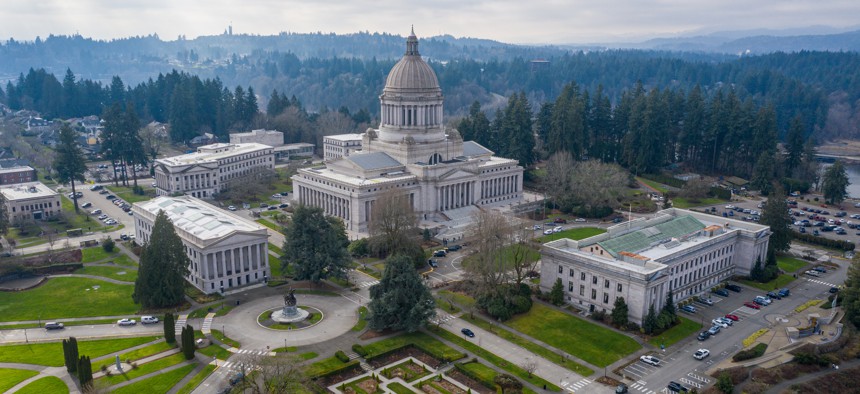Can the snarky ‘Save Our Yachts’ campaign save Washington’s capital gains tax?

The State Capitol building in Olympia, Washington DutcherAerials via Getty Images
The long-fought-for and hard-won tax has survived its legal challenges. Now it must survive the ballot.
You're reading Route Fifty's Public Finance Update. To get the latest on state and local budgets, taxes and other financial matters, you can subscribe here to get this update in your inbox twice each month. You can find a full archive of these newsletters here.
Welcome back to Route Fifty’s Public Finance Update! This week, we look at an effort in Washington state to repeal its long-fought-for and hard-won capital gains tax. Voters there will decide whether or not to keep it in November, but already the campaigns for and against it are gearing up. Last week, the group Fuse Washington launched its “Save Our Yachts” campaign.
“Many of us are upgrading our yachts for the summer, and now is NOT the time for us to keep paying taxes on our Wall Street profits. One year of it was enough!!" reads the group’s website. The snarky campaign is part of the opposition effort to Initiative 2109, which will ask voters in the Evergreen State if they want to repeal a 7% tax on capital gains of more than $250,000 from the sale of stocks and bonds, excluding revenue from real estate and retirement accounts, among other exceptions.
Support for the initiative is being run out of the PAC “Let's Go Washington,” which is led by state Rep. Jim Walsh, a Republican, and conservative donor and businessman Brian Heywood. They want the tax repealed, arguing that doing away with it will benefit all Washington residents.
“Our state’s economic and technological growth hub status has been attributed to the absence of a capital gains income tax, fostering job creation and generating tens of billions of dollars in wealth,” Walsh said in a statement. “It’s a shame to discard that advantage. I-2109 aims to restore it, protecting our competitive edge."
Paid primarily by wealthier Washingtonians, the capital gains tax was a policy change long-sought by Democrats. In fact, Aaron Ostrom, Fuse's executive director, said "Save Our Yachts” was cooked up in response to earlier grumbling over the tax—before the initiative emerged—according to the Washington State Standard.
Washington state’s reputation is liberal, but its tax system is regressive—setting it apart from most blue states. So much so that until it established the capital gains tax in 2021, the state consistently ranked No. 1 on the Institute on Taxation and Economic Policy’s list of states with the most regressive tax policy. Today, it’s No. 2, just behind Florida.
Still, the capital gains tax is seen as a move toward a less-regressive tax system, which takes a proportionally larger share from lower- and middle-income residents than from wealthier taxpayers. It was a major win for Democrats, who had been trying for at least a decade to make the wealthy pay a higher share of state taxes.
According to Crosscut, a capital gains tax was first introduced in 2012 by now House Speaker Laurie Jinkins. Gov. Jay Inslee proposed one in December 2014. A version put forward in 2021 finally passed and made it to Inslee’s desk for his signature.
The tax was almost immediately challenged in court. Opponents to the tax argued that it was functionally an income tax and therefore a violation of the state constitution’s strict rules on these taxes, while supporters said it operated as a sales tax and was therefore legal. In March of last year, the state Supreme Court agreed, upholding the tax.
In January, the U.S. Supreme Court declined to hear an appeal of the state Supreme Court ruling.
The tax went into effect in 2022 and brought in nearly $900 million in its first year, greatly exceeding original projections. The first $500 million collected goes toward education and child care programs, while the remainder is designated for school construction projects.
It’s the first tax of its type in Washington history. Most states have their own capital gains tax, in addition to federal capital gains taxes.
Coupled with another long-sought policy—the Working Families Tax Credit—it has gone a long way to make the state’s tax system more equitable in the eyes of many Democrats. The credit helps low-income families and individuals make ends meet by providing up to $1,255 per year in a refundable tax credit. It has benefited more than 162,000 Washington households since its launch last year.
But now the capital gains tax will have to survive the ballot in November.
“The boneheads in state government and on the Supreme Court seem to think that we should keep paying state taxes just like regular people do,” quips the “Save Our Yachts” website. “But we’ve built a lifestyle for ourselves that shouldn’t be ripped away because of some ‘law.’ The rules have never applied to us before, why should they now?”





